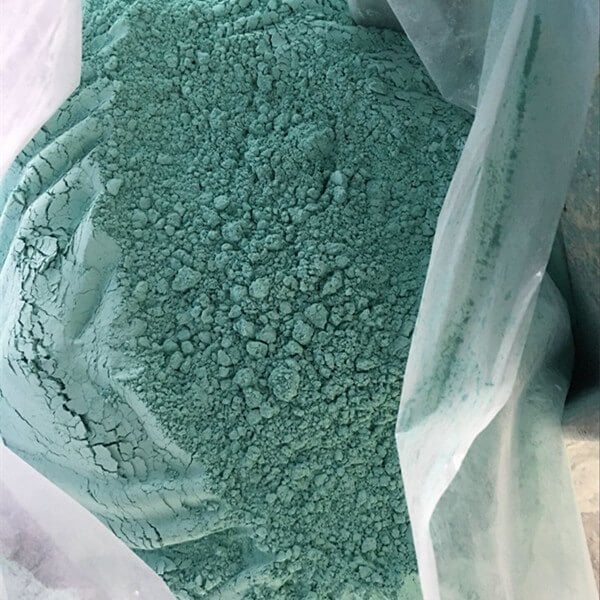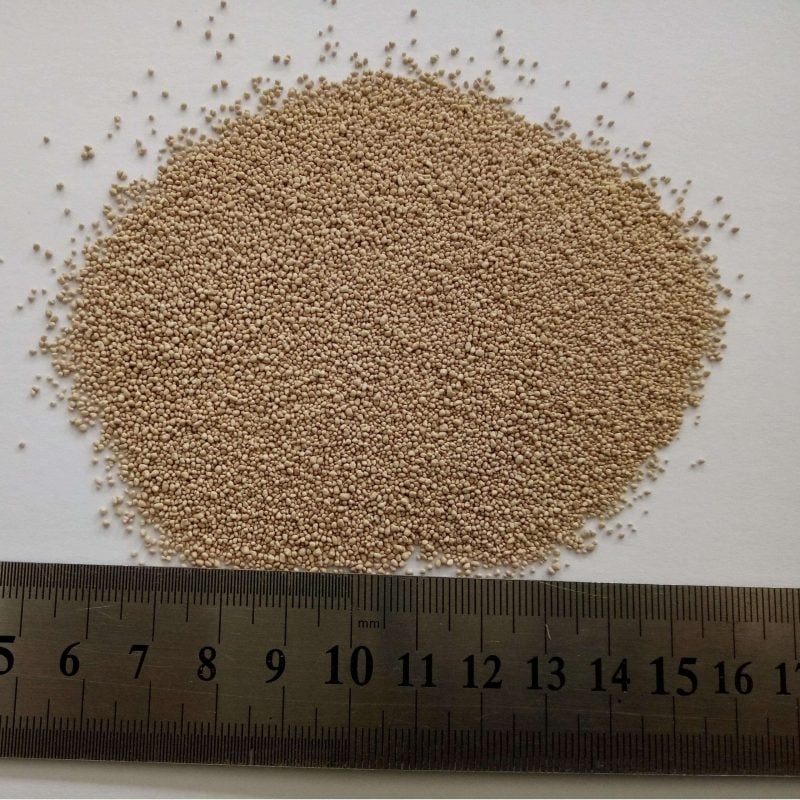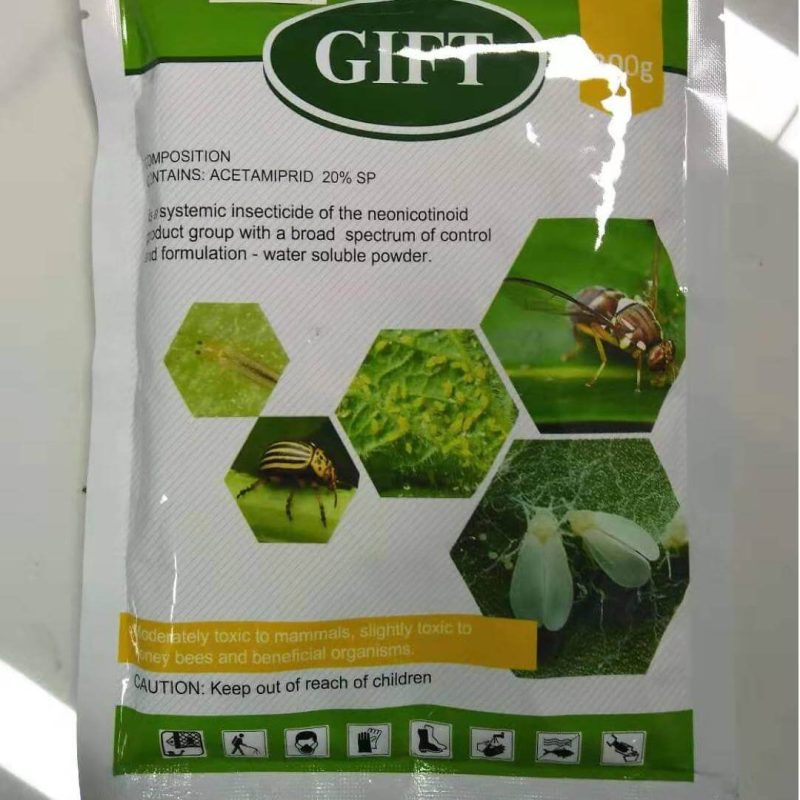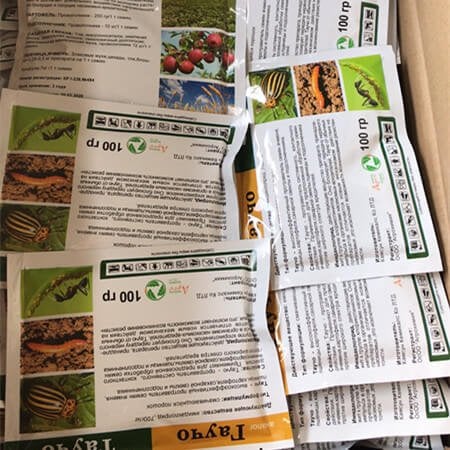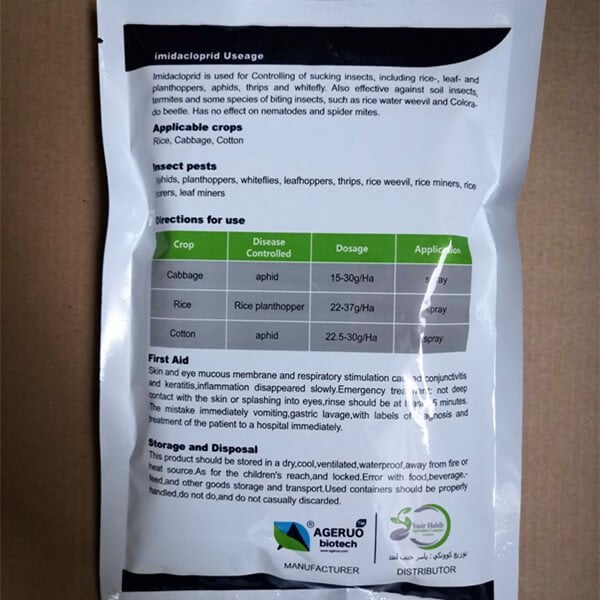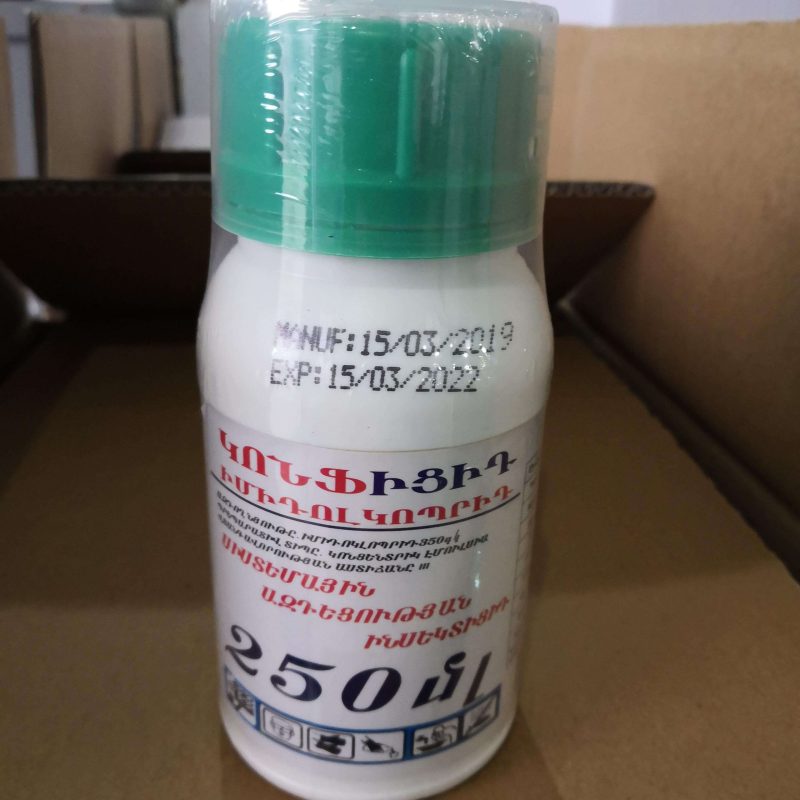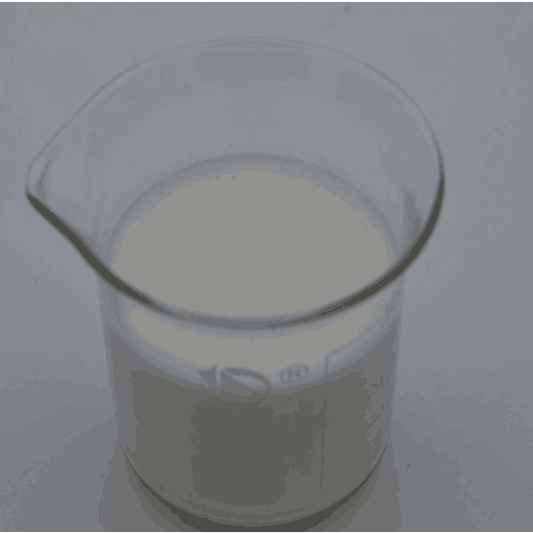Pets and Imidacloprid: How Safe Is It for Your Dog or Cat?
When it comes to pesticides and pet care, one commonly used product is Imidacloprid. This powerful neonicotinoid insecticide is used in a variety of contexts, from lawn care to flea treatments for pets. But as effective as it is in controlling pests like fleas, ticks, and mosquitoes, many pet owners wonder: Is Imidacloprid safe for pets? In this article, we will explore the safety of Imidacloprid for dogs, cats, and other pets, as well as how you can safely use this pesticide around your furry friends.
What Is Imidacloprid?
Imidacloprid is a synthetic insecticide that belongs to the neonicotinoid family of chemicals. It works by targeting the nervous system of insects, blocking a specific receptor in the insect’s brain, which ultimately leads to the insect’s death. It is commonly found in flea control products for dogs and cats as well as lawn pesticides for controlling grubs and broadleaf weeds. Imidacloprid is sold in various formulations, including spot-on treatments, sprays, and granules, making it a versatile tool in pest management.
How Does Imidacloprid Affect Pets?
Imidacloprid can be toxic to pets, particularly when ingested or when they come into direct contact with it. Pets, especially cats and dogs, can accidentally ingest Imidacloprid by licking it off their skin or fur after a spot-on treatment. Additionally, if Imidacloprid is applied improperly or too frequently, pets can suffer from toxic exposure.
Symptoms of Imidacloprid poisoning in pets include:
- Drooling and vomiting
- Tremors or muscle weakness
- Loss of coordination
- Seizures (in severe cases)
It’s essential to follow the application instructions carefully to ensure that your pet is not exposed to toxic levels of Imidacloprid.
Is Imidacloprid Safe for Cats?
While Imidacloprid is generally considered safe for use on cats when applied according to the instructions, cats are particularly sensitive to neonicotinoids. Cats metabolize chemicals differently than dogs, and overexposure can lead to toxicity. As a result, it’s important to choose products that are specifically formulated for cats and follow the correct application methods.
- Flea treatments for cats should never be applied to dogs, as the formulations are different, and dog flea treatments can be toxic to cats.
- Always keep cats away from freshly treated areas, especially if you’ve used lawn pesticides containing Imidacloprid.
Is Imidacloprid Safe for Dogs?
For dogs, Imidacloprid is generally safe when used according to the manufacturer’s directions. It is widely used in dog flea treatments such as Advantage®, which targets fleas by killing both adult fleas and larvae. However, overapplication or accidental ingestion of Imidacloprid can cause toxicity.
- Never apply a dog flea treatment to your cat as this can result in a dangerous overdose.
- Monitor your dog for any adverse reactions such as vomiting, lethargy, or tremors after applying Imidacloprid, and consult your vet immediately if symptoms persist.
Imidacloprid Lawn Pesticides and Pets
When using Imidacloprid for lawn care, it’s essential to be cautious, especially if you have pets that frequently play or walk on treated grass. While Imidacloprid is generally safe when applied properly, pets can be exposed to the pesticide if they come into contact with freshly treated surfaces. To reduce exposure:
- Wait until the pesticide has dried: After applying Imidacloprid to your lawn, keep pets away until the product has dried completely. This can typically take a few hours depending on the weather and application method.
- Avoid overapplication: Always follow the label instructions on the lawn pesticide product to prevent applying too much, which could pose a risk to your pets.
What Should Pet Owners Do If Their Pet Is Exposed to Imidacloprid?
If your pet has been exposed to Imidacloprid, whether by licking treated fur or walking on treated grass, here’s what you should do:
- Wash the area: If your pet has skin contact with Imidacloprid, wash the affected area immediately with mild soap and warm water.
- Observe for symptoms: Monitor your pet for any signs of poisoning, such as vomiting, drooling, or muscle tremors.
- Contact your vet: If symptoms appear or if you are concerned about exposure, contact your vet immediately for guidance.
Alternative Treatments for Fleas and Pest Control for Pets
If you’re concerned about the safety of Imidacloprid or want to explore alternatives, there are safer or natural options for flea and pest control for your pets:
- Flea collars with natural ingredients like cedarwood and neem.
- Diatomaceous earth, a non-toxic substance that kills fleas by desiccating their exoskeletons.
- Flea shampoos with natural oils like lavender or cedar.
Always consult with your veterinarian before switching to a new treatment to ensure it’s safe and effective for your pet.
Conclusion: Is Imidacloprid Safe for Pets?
In conclusion, Imidacloprid can be safe for pets if used correctly, but it is crucial to understand the potential risks associated with its use, especially for cats and dogs. Pet owners should always follow the manufacturer’s instructions and take precautions to avoid accidental exposure. If you’re concerned about the risks of Imidacloprid, consider consulting with your veterinarian to explore safer alternatives for flea and pest control.
Frequently Asked Questions (FAQs)
-
Is Imidacloprid safe for dogs?
- Yes, Imidacloprid is generally safe for dogs when used as directed. However, overexposure or ingestion can be harmful, so it’s important to monitor your pet after use.
-
Can Imidacloprid be used on cats?
- Imidacloprid is safe for use on cats when used in products formulated specifically for them. Never apply dog formulations to cats.
-
Is Imidacloprid safe for pets in lawn care products?
- Imidacloprid can be safe in lawn pesticides if you keep pets away from treated areas until the product has dried. Always follow label instructions for safe application.
-
What should I do if my pet ingests Imidacloprid?
- If your pet ingests Imidacloprid, contact your veterinarian immediately. Symptoms may include vomiting, drooling, and muscle tremors.
-
Are there natural alternatives to Imidacloprid for flea control?
- Yes, there are natural alternatives such as flea collars with essential oils, neem oil, and diatomaceous earth.
When it comes to pesticides and pet care, one commonly used product is Imidacloprid. This powerful neonicotinoid insecticide is used in a variety of contexts, from lawn care to flea treatments for pets. But as effective as it is in controlling pests like fleas, ticks, and mosquitoes, many pet owners wonder: Is Imidacloprid safe for pets? In this article, we will explore the safety of Imidacloprid for dogs, cats, and other pets, as well as how you can safely use this pesticide around your furry friends.
What Is Imidacloprid?
Imidacloprid is a synthetic insecticide that belongs to the neonicotinoid family of chemicals. It works by targeting the nervous system of insects, blocking a specific receptor in the insect’s brain, which ultimately leads to the insect’s death. It is commonly found in flea control products for dogs and cats as well as lawn pesticides for controlling grubs and broadleaf weeds. Imidacloprid is sold in various formulations, including spot-on treatments, sprays, and granules, making it a versatile tool in pest management.
How Does Imidacloprid Affect Pets?
Imidacloprid can be toxic to pets, particularly when ingested or when they come into direct contact with it. Pets, especially cats and dogs, can accidentally ingest Imidacloprid by licking it off their skin or fur after a spot-on treatment. Additionally, if Imidacloprid is applied improperly or too frequently, pets can suffer from toxic exposure.
Symptoms of Imidacloprid poisoning in pets include:
- Drooling and vomiting
- Tremors or muscle weakness
- Loss of coordination
- Seizures (in severe cases)
It’s essential to follow the application instructions carefully to ensure that your pet is not exposed to toxic levels of Imidacloprid.
Is Imidacloprid Safe for Cats?
While Imidacloprid is generally considered safe for use on cats when applied according to the instructions, cats are particularly sensitive to neonicotinoids. Cats metabolize chemicals differently than dogs, and overexposure can lead to toxicity. As a result, it’s important to choose products that are specifically formulated for cats and follow the correct application methods.
- Flea treatments for cats should never be applied to dogs, as the formulations are different, and dog flea treatments can be toxic to cats.
- Always keep cats away from freshly treated areas, especially if you’ve used lawn pesticides containing Imidacloprid.
Is Imidacloprid Safe for Dogs?
For dogs, Imidacloprid is generally safe when used according to the manufacturer’s directions. It is widely used in dog flea treatments such as Advantage®, which targets fleas by killing both adult fleas and larvae. However, overapplication or accidental ingestion of Imidacloprid can cause toxicity.
- Never apply a dog flea treatment to your cat as this can result in a dangerous overdose.
- Monitor your dog for any adverse reactions such as vomiting, lethargy, or tremors after applying Imidacloprid, and consult your vet immediately if symptoms persist.
Imidacloprid Lawn Pesticides and Pets
When using Imidacloprid for lawn care, it’s essential to be cautious, especially if you have pets that frequently play or walk on treated grass. While Imidacloprid is generally safe when applied properly, pets can be exposed to the pesticide if they come into contact with freshly treated surfaces. To reduce exposure:
- Wait until the pesticide has dried: After applying Imidacloprid to your lawn, keep pets away until the product has dried completely. This can typically take a few hours depending on the weather and application method.
- Avoid overapplication: Always follow the label instructions on the lawn pesticide product to prevent applying too much, which could pose a risk to your pets.
What Should Pet Owners Do If Their Pet Is Exposed to Imidacloprid?
If your pet has been exposed to Imidacloprid, whether by licking treated fur or walking on treated grass, here’s what you should do:
- Wash the area: If your pet has skin contact with Imidacloprid, wash the affected area immediately with mild soap and warm water.
- Observe for symptoms: Monitor your pet for any signs of poisoning, such as vomiting, drooling, or muscle tremors.
- Contact your vet: If symptoms appear or if you are concerned about exposure, contact your vet immediately for guidance.
Alternative Treatments for Fleas and Pest Control for Pets
If you’re concerned about the safety of Imidacloprid or want to explore alternatives, there are safer or natural options for flea and pest control for your pets:
- Flea collars with natural ingredients like cedarwood and neem.
- Diatomaceous earth, a non-toxic substance that kills fleas by desiccating their exoskeletons.
- Flea shampoos with natural oils like lavender or cedar.
Always consult with your veterinarian before switching to a new treatment to ensure it’s safe and effective for your pet.
Conclusion: Is Imidacloprid Safe for Pets?
In conclusion, Imidacloprid can be safe for pets if used correctly, but it is crucial to understand the potential risks associated with its use, especially for cats and dogs. Pet owners should always follow the manufacturer’s instructions and take precautions to avoid accidental exposure. If you’re concerned about the risks of Imidacloprid, consider consulting with your veterinarian to explore safer alternatives for flea and pest control.
Frequently Asked Questions (FAQs)
-
Is Imidacloprid safe for dogs?
- Yes, Imidacloprid is generally safe for dogs when used as directed. However, overexposure or ingestion can be harmful, so it’s important to monitor your pet after use.
-
Can Imidacloprid be used on cats?
- Imidacloprid is safe for use on cats when used in products formulated specifically for them. Never apply dog formulations to cats.
-
Is Imidacloprid safe for pets in lawn care products?
- Imidacloprid can be safe in lawn pesticides if you keep pets away from treated areas until the product has dried. Always follow label instructions for safe application.
-
What should I do if my pet ingests Imidacloprid?
- If your pet ingests Imidacloprid, contact your veterinarian immediately. Symptoms may include vomiting, drooling, and muscle tremors.
-
Are there natural alternatives to Imidacloprid for flea control?
- Yes, there are natural alternatives such as flea collars with essential oils, neem oil, and diatomaceous earth.

